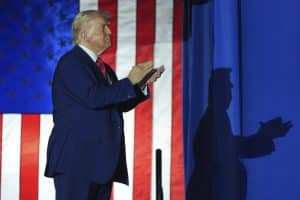Much has been said about the recent CNN Town Hall with former President Donald Trump. The network has been taken to task, Kaitlin Collins has been excoriated for her inability to stop the firehose of misinformation that drenched the audience, and the overall verdict is that Trump “won” the night, whatever that means.
Puck had terrific reporting about the room where it happened, noting that the audience had been explicitly told not to boo but encouraged to cheer, making the audio of the event sound disproportionately positive. While it might be comforting to know that the entire audience had not been stacked with relatives of Corey Lewandowski, the impression remained that Trump was en fuego, calling Collins a “nasty person” to an enthusiastically receptive crowd while he dipped into his well of false 2020 election denial. As a result, there has been much pearl clutching, even from inside CNN.
Like here. And also, here. To this I say: Meh.
As is usually the case in a democracy, the problem lies with the people: The base voters of the GOP want Trump, and CNN wants an audience who will stay tuned to the slow-moving car-crash that is Trump in a live setting. Between these two groups of people, there’s enough incentive to throw the fantastic advice of Bulwark’s Jonathan Last to the wind. The American people, apparently, want the most debased, primal, and compelling version of politics that exists, at which they can cheer or sneer. If you are a producer, booker, or TV executive, you want the eyeballs. In this case, the math is easy: audience = money.
The bad news is that politics is pretty boring in real life, except when someone walks on to the stage, brandishes a blow torch, and makes everything personal and vicious while he sets the podium on fire. Cable news producers have 24 hours to fill, and most people will not sit still for that much process, legalese, and careful negotiation. C-SPAN is a good example of this. The old adage goes “if it bleeds, it leads.” This means that when a buffoon, armed with the verbal equivalent of a scythe and an annoyed python, hops onto a stage to act like a maniac, it is mutually beneficial for candidates and for struggling cable news networks.
And this is why the 2024 election cannot be covered with genuine concern for old school ideas like “journalistic norms:” the American public has made it abundantly clear that they want Trump, either as a hero or as a miscreant. The media have watched their profits soar when Trump had the spotlight, and then drop like a stone when he was off the world stage. Chris Christie may complain that President Biden is “boring,” but no one can complain more than the political media who cover him.
There was similar national agita during the O.J. Simpson trial in 1995, when 150 million people (57 percent of the country) watched the verdict live on TV. I remember more than one person lamenting to me the nonstop coverage. When I’d ask: “Do you watch it?” and they’d say “Yes. Of course!” I’d respond with: “Well, that’s the problem then, isn’t it?” If we all turned this stuff off, nobody would air it.
The argument in favor of shining a light on Trump’s outrageous and outraging behavior is, ostensibly, to provide information for the voting public. As we approach the eight-year anniversary of the most famous escalator ride in history, I think we’ve gotten the picture. We know who Trump is. His supporters love him because of this, his detractors toss back Tums to relieve their mounting anxiety like fraternity pledges with warm, cheap beer. Trump knows exactly how he plays in Peoria, which is why he behaves as he does. He earned $5 billion in free media in 2016, arguably more than that in 2020 as he was an incumbent president. He’s a media guy and he knows, as actors say, where the lens is.
It is up to us, the public, to deny him that lens. Trump won’t change and the media won’t either. The only change can come from the people who feed the beast, and thus it is in our hands to be the change.
To quote the 20th Century cartoon “Pogo,” publicizing the first Earth Day in 1970, mocking a quote from Commodore Oliver Perry fighting in the War of 1812: “We have met the enemy and he is us.”







